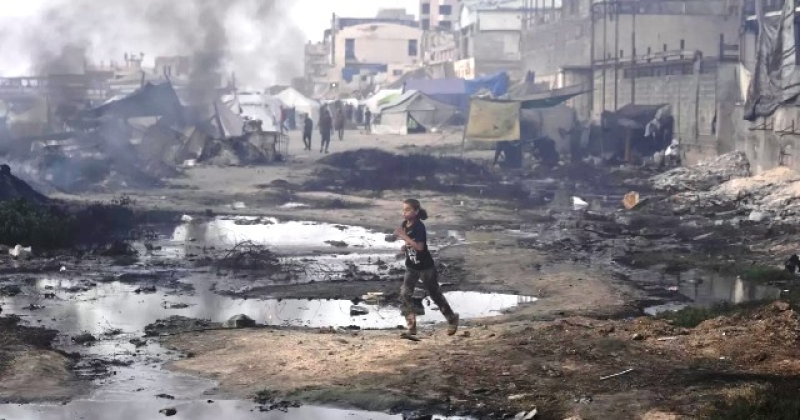- Puppet show enchants Children as Boi Mela comes alive on day 2 |
- DSCC Admin Salam’s drive to make South Dhaka a ‘clean city’ |
- 274 Taliban Dead, 55 Pakistan Troops Killed |
- Now 'open war' with Afghanistan after latest strikes |
- Dhaka's air quality fourth worst in world on Friday morning |
Israeli forces, allies fire on crowd near Gaza aid site: 14 killed

A Palestinian girl runs past the ruins of destroyed buildings along the Gaza City shoreline on Monday, June 9, 2025. (AP Photo-Jehad Alshrafi).
Palestinian sources said Israeli forces and their allied local gunmen fired on a crowd heading to a food distribution point backed by Israel and the United States in Gaza early Monday. According to Gaza's Health Ministry and local hospitals, 14 people were killed.
Eyewitnesses reported that the gunmen, who appeared to be cooperating with Israeli troops, retreated into an Israeli military zone in Rafah after the crowd began throwing stones at them. The Israeli military has not yet commented on the incident. Israel recently acknowledged supporting armed local groups opposed to Hamas.
This incident is the latest in a series of shootings that have killed at least 127 people and injured hundreds since the implementation of a new food distribution model last month, as per Gaza’s Health Ministry. While Israel and the U.S. say the new system is intended to bypass Hamas, it has faced rejection from the United Nations and major aid organizations.
Experts warn that the Israeli blockade and military campaign have pushed Gaza to the brink of famine. With nearly all food production destroyed, the region’s two million residents rely almost entirely on humanitarian aid.
Israeli forces intercept Gaza aid vessel, detain Greta Thunberg, fellow activists
Palestinians allege Israeli forces have repeatedly opened fire on people approaching food centers. Previously, the Israeli military claimed it fired warning shots when individuals neared its forces near the aid distribution sites, which are located in restricted military areas inaccessible to independent journalists.
The Gaza Humanitarian Foundation (GHF), a private contractor managing the centers, stated there has been no violence at or near the sites. However, GHF has cautioned aid seekers that straying from the designated routes set by the military poses “a great danger.” Operations at the three sites were paused last week for safety discussions with the military.
On Monday, GHF suspended activity at the Rafah center due to what it described as “chaotic crowd conditions,” according to a Facebook page affiliated with the group. A spokesperson for GHF did not immediately respond to inquiries.
Gunfire Erupts in “Dangerous Zone”
Heba Joda, who was among those present, said gunfire broke out at a roundabout roughly a kilometer from the aid center—a location of previous incidents. She said the shooting came from the “dangerous zone” controlled by Israeli forces and their allies.
She noted that members of a local militia led by Yasser Abu Shabab, known as the Popular Forces, were attempting to organize the crowd. When the crowd surged forward, the gunmen opened fire, prompting people to throw stones. The militia members then withdrew toward Israeli military lines.
While the Popular Forces claim to be guarding the GHF centers in southern Gaza, GHF insists it does not coordinate with them. Aid workers allege the group has a record of looting U.N. aid convoys.
Hussein Shamimi, another witness, said his 14-year-old cousin was among those killed. “It was an ambush... Israelis on one side, Abu Shabab’s men on the other,” he said.
Mohamed Kabaga, who was treated for a neck wound at Nasser Hospital in Khan Younis, said masked gunmen fired directly at the crowd after attempting to impose order. He estimated there were about 50 armed men with 4x4 vehicles stationed near the roundabout close to Israeli military lines. “We didn’t receive any aid,” he said. “They just shot at us.”
Nasser Hospital confirmed it had received 14 bodies from the incident. Zaher al-Waheidi, head of the Health Ministry’s record department, said more than 99 people were injured.
Israel has pushed for GHF to replace the U.N.-managed system that had been delivering food, medicine, and other necessities since the war began. Israeli officials accuse Hamas of diverting aid for militant use, though U.N. authorities say there's no evidence of systematic diversion.
The U.N. and humanitarian organizations have rejected the GHF-led model, arguing it cannot meet Gaza's large-scale needs and serves Israeli military objectives—including efforts to move the population southward.
Previously, the U.N. network had distributed supplies at numerous points across Gaza, reducing the need for civilians to cross long distances through militarized zones.
Israel completely blocked Gaza’s access to food, fuel, and medicine in early March, just before breaking a ceasefire with Hamas. Although limited aid has been allowed in since last month, U.N. agencies say distribution has been hampered by Israeli restrictions, security breakdowns, and looting.
War Now in Its 20th Month
The conflict began on October 7, 2023, when Hamas-led militants entered Israel, killing about 1,200 people—mostly civilians—and taking 251 hostages. Israel says 55 hostages remain in captivity, more than half believed dead, while the rest were released in deals or ceasefires.
Israel’s military offensive has killed more than 54,900 Palestinians, according to the Gaza Health Ministry. The majority are reported to be women and children, though the ministry does not distinguish between civilians and fighters. The war has razed large parts of Gaza and displaced approximately 90% of its population.
Hamas demands a permanent ceasefire and full Israeli withdrawal in exchange for releasing the remaining hostages. Israel insists the war will not end until all hostages are freed and Hamas is dismantled or driven into exile.
Israeli Prime Minister Benjamin Netanyahu has stated that even after the war, Israel will retain open-ended control over Gaza and pursue what he calls the “voluntary emigration” of much of its population—an idea widely rejected by the international community and Palestinians, who see it as forced displacement, reports UNB.

